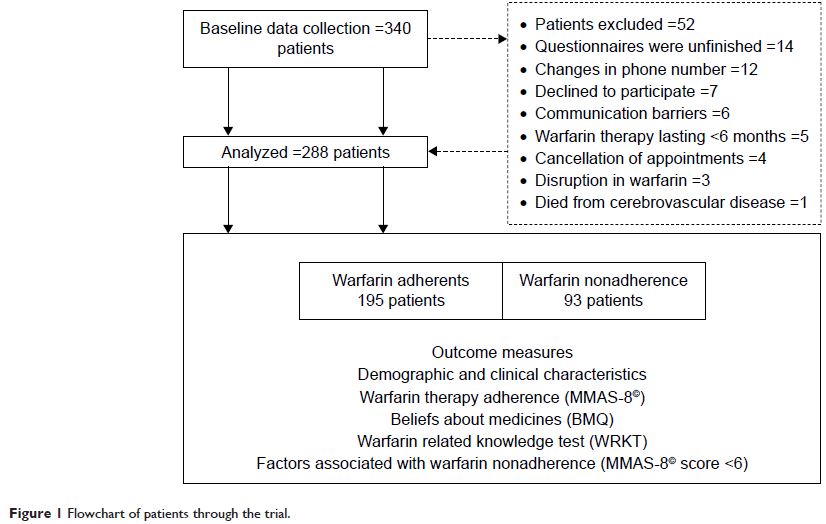109568
论文已发表
注册即可获取德孚的最新动态
IF 收录期刊
- 3.4 Breast Cancer (Dove Med Press)
- 3.2 Clin Epidemiol
- 2.6 Cancer Manag Res
- 2.9 Infect Drug Resist
- 3.7 Clin Interv Aging
- 5.1 Drug Des Dev Ther
- 3.1 Int J Chronic Obstr
- 6.6 Int J Nanomed
- 2.6 Int J Women's Health
- 2.9 Neuropsych Dis Treat
- 2.8 OncoTargets Ther
- 2.0 Patient Prefer Adher
- 2.2 Ther Clin Risk Manag
- 2.5 J Pain Res
- 3.0 Diabet Metab Synd Ob
- 3.2 Psychol Res Behav Ma
- 3.4 Nat Sci Sleep
- 1.8 Pharmgenomics Pers Med
- 2.0 Risk Manag Healthc Policy
- 4.1 J Inflamm Res
- 2.0 Int J Gen Med
- 3.4 J Hepatocell Carcinoma
- 3.0 J Asthma Allergy
- 2.2 Clin Cosmet Investig Dermatol
- 2.4 J Multidiscip Healthc

影响中国心房颤动患者的药物知识和对华法林 (Warfarin) 依从性信念的因素
Authors Zhao S, Zhao H, Wang X, Gao C, Qin Y, Cai H, Chen B, Cao J
Received 29 August 2016
Accepted for publication 30 November 2016
Published 9 February 2017 Volume 2017:11 Pages 213—220
DOI https://doi.org/10.2147/PPA.S120962
Checked for plagiarism Yes
Review by Single-blind
Peer reviewers approved by Dr Akshita Wason
Peer reviewer comments 2
Editor who approved publication: Dr Naifeng Liu
Objectives: Warfarin is often used for ischemic stroke prevention in
patients with atrial fibrillation (AF), but the factors affecting patient
adherence to warfarin therapy have not been fully understood.
Methods: A cross-sectional survey was conducted in AF patients
undergoing warfarin therapy at least 6 months prior to the study. The clinical
data collected using questionnaires by phone interviews included the following:
1) self-reported adherence measured by the Morisky Medication Adherence Scale-8©; 2) beliefs about medicines surveyed by Beliefs
about Medicines Questionnaire (BMQ); and 3) drug knowledge as measured by the
Warfarin Related Knowledge Test (WRKT). Demographic and clinical factors
associated with warfarin adherence were identified using a logistic regression
model.
Results: Two hundred eighty-eight patients completed the survey
and 93 (32.3%) of them were classified as nonadherent (Morisky Medication
Adherence Scale-8 score <6). Major factors predicting warfarin adherence
included age, cardiovascular disorders, WRKT, and BMQ; WRKT and BMQ were independently
correlated with adherence to warfarin therapy by multivariate logistic
regression analysis. Adherents were more likely to have greater knowledge
scores and stronger beliefs in the necessity of their specific medications
([odds ratio {OR} =1.81, 95% confidence interval {CI} =1.51–2.15] and [OR
=1.17, 95% CI =1.06–1.29], respectively). Patients with greater concerns about
adverse reactions and more negative views of general harm were more likely to
be nonadherent ([OR =0.76, 95% CI =0.69–0.84] and [OR =0.82, 95% CI
=0.73–0.92], respectively).
Conclusion: BMK and WRKT are related with patient behavior toward
warfarin adherence. BMQ can be applied to identify patients at increased risk
of nonadherence.
Keywords: anticoagulation
control, INR, MMAS-8©, beliefs about medicine,
warfarin
